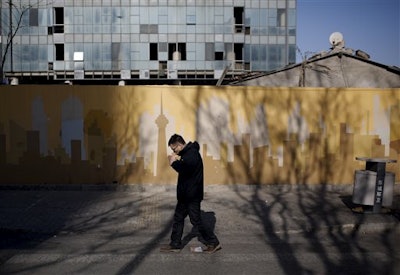
China's central bank unexpectedly slashed interest rates on Friday to re-energize the world's No. 2 economy, joining a growing list of major economies that are trying to encourage growth in the face of a global slowdown.
The president of the European Central Bank said Friday he was ready to step up stimulus for the 18-country eurozone economy, where growth is meager and unemployment is soaring. And Japan's government this week delayed a tax increase after the country slipped back into recession. Japan's central bank late last month increased its purchases of government bonds and other assets to try to revive growth.
News of China's actions and the ECB's hints of further stimulus triggered a surge in stock markets, particularly in Europe. Germany's DAX rose 2.6 percent, while the Dow Jones industrial average rose 0.5 percent to close at a record high. Asian stocks had closed before the Chinese announcements.
Friday's moves highlighted an increasing divide in the global economy. The United States is showing signs of steady growth, prompting the Federal Reserve to rein in its stimulus efforts.
So far, the U.S. has escaped any drag from the slowdown overseas. Fed policymakers said at a meeting last month that the impact on the U.S. would be "quite limited."
Jay Bryson, a global economist at Wells Fargo Securities, said the U.S. is "relatively insulated" from overseas developments. Exports are a smaller source of growth than in other developed nations and many major employers, such as health care and education providers, are largely unaffected by overseas activity.
The slowdown in global growth is becoming an increasing concern for policymakers. Japan confirmed this week that it has fallen back into recession and will delay a tax increase to help consumer spending.
In Europe, it is not only weak growth but also the low inflation rate that is worrying the ECB. Low inflation or an outright drop in prices can weaken an economy further by encouraging delays in spending and investment. The economy of the 18-country eurozone grew by a scant 0.2 percent in the third quarter compared with the previous three months.
As indicators for the eurozone and global economy disappoint, ECB President Mario Draghi was firm in his message: "''We will do what we must to raise inflation and inflation expectations as fast as possible," he said in a speech in Frankfurt.
Of major economies, only the U.S. is considering raising interest rates. The Federal Reserve only recently ended a massive bond-buying program that helped reduce market interest rates because the economy is strengthening.
But the prospect of higher rates in the U.S. is exposing the country to a potentially painful rise in the dollar — currencies tend to strengthen with higher rates. The dollar hit a seven-year high against the yen, and jumped almost 1 percent against the euro on Friday. A stronger dollar makes it tougher for U.S. exporters to sell their goods internationally.
The People's Bank of China said it is trying to address "financing difficulties" caused by a shortage of credit. It also said the move was not a change in monetary policy and economic conditions are within an "appropriate range."
China's economic growth fell to a five-year low of 7.3 percent in the latest quarter and manufacturing and other indicators are declining. That has prompted suggestions Beijing might intervene to prop up growth.
The rate charged by banks for loans to each other rose this week to its highest level since early October, reflecting reduced availability of credit, a concern for Chinese economic planners.
"If necessary, the central bank will provide timely liquidity support," or extra credit to markets, it said in a separate statement.
The bank cut the rate on a one-year loan by commercial banks by 0.4 percentage points to 5.6 percent. The rate paid on a one-year savings was lowered by 0.25 point to 2.75 percent.
It was the first rate cut since July 2012, and comes after the Cabinet called this week for steps to reduce financing costs for industry to make the economy more efficient.
Bryson of Wells Fargo Securities said the bank's move would have only a limited impact on China's economy. But it does signal that Chinese officials' concerns about growth are rising, he said, a sign they may take further steps in the coming months.
In China, changes in interest rates have a limited direct effect on the government-dominated economy but are seen as a signal to banks to lend more and to state companies that they are allowed to step up borrowing.
"The reduction in the benchmark lending rate will mainly benefit the larger, typically state-owned firms that borrow from banks," said Mark Williams of Capital Economics in a report. Most of China's private companies cannot get loans from the state-owned banking industry and rely on an underground credit market.
"This does not necessarily signal that policymakers are going back on efforts to support smaller companies, or giving up on 'targeted easing,' but they apparently feel larger firms are now in need of support too."






















